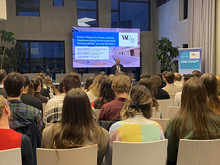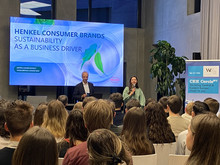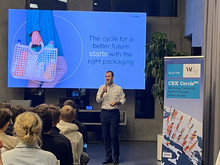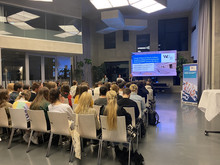"From Vision to Green Action: Implementing Environmental Sustainability Across Borders" - Review
To better understand the view from manufacturers and their contributions to a sustainable planet the Central Europe Connect-Program and the CEE CercleWU invited representatives of the manufacturing industry to a panel discussion at WU. The aim of this panel was to discuss the integration of sustainability into strategy and operations, the dilemmas managers face in the implementation, and the role of multinational firms in the creation of awareness and dissemination of best environmental practices in foreign operations.
Introducing sustainability in corporate governance and operating processes is a tremendous management challenge, particularly for manufacturers. Production processes, supply chains, marketing strategies and product usage have to be assessed and compared with “greener” alternatives. Building sustainability into operations needs changes in ambitions, corporate governance, organizational culture and business processes. Depending on the type of business, companies are affected in different ways: be it the sourcing of appropriate raw materials, use of clean energy, avoidance of biodiversity degradation, air and water pollution or recycling. Western multinational firms are often regarded as pioneers which take proactive steps to reduce their environmental footprint, strive for net zero GHG emissions and transfer effective sustainable practices internationally within their corporate group.
Under the moderation of Arnold Schuh, WU, Theres Bertsch, Sustainability Manager Europe, Henkel Consumer Brands, and Rainer Widmar, Managing Director Central and Eastern Europe, ALPLA, discussed the efforts towards environmental sustainability of their multinational companies.
Theres Bertsch highlighted the goals and realized projects of Henkel Consumer Brands, the FMCG company with well-known brands in the laundry (Persil), home care (Pril, Somat) and beauty care (Schwarzkopf, Taft, Syoss), towards a circular and net-zero future. The MNC has committed itself to an accelerated transformation towards higher sustainability starting with corporate purpose describing the ambition to act for the good over measures in reducing emissions along the product’s value chain to the transformation of the whole product portfolio. So far, the focus was on 100% renewable and degradable raw materials by 2030, more than 30% recycled plastic in the packaging by 2025 and carbon neutral production using renewable energy by 2030. Increasing the share of circular packaging plays a major role in this process too.
Based on the evidence that sustainability correlates positively with financial success the company Henkel sees sustainability as an accelerator for competitiveness. Efficient processes use less CO2 and are less costly. Innovation is key in reducing energy consumption (e.g., cold-water laundry) and replacing fossil oil-based components (e.g., circular packaging). Talents are increasingly flocking to employers who act for the good of present and future generations. Finally, brands with a credible green claim are more competitive in today’s markets.
However, most consumers do not believe in those sustainability claims and suspect companies of “greenwashing”. The statement “all companies only care about profits and eco-claims are just another marketing tool” finds strong support: 69% in Germany, 61% in France, and 56% in Poland. At the same time, 97% of people say that they want to live in a more sustainable way but only 13% are actively changing their behavior. Unfortunately, product usage (showering, dish and laundry washing etc.) is representing the largest share (77%) of the CO2 footprint along the Henkel’s product value chain. To increase awareness and nudge consumers to a greener lifestyle, Henkel started the multi-brand promotion concept “It starts with us” where consumers can find simple hacks to make small changes to their everyday habits.
Coming from ALPLA, the Austrian plastic packaging producer with a global presence, Rainer Widmar had an even more challenging stance. With nearly 200 production facilities in 47 countries ALPLA “touches more than 3 billion people daily around the world”. As a family-owned company in the 3rd generation providing climate-friendly packaging solutions was always a key value. The “4 R’s” reduce, reuse, recycle and replace have been guiding their green efforts. Rainer Widmar emphasized safety, affordability, recyclability, and a lower CO2 footprint of plastic packaging compared to glass bottles, especially when they are made recycled PET. In ten dedicated plants ALPLA recycles 30 million bottles per day. But why do we have this global plastic problem globally? Only 10% of the plastic is recycled today. Littering our nature is the key cause. Missing collection systems and a lack of individual discipline are hampering higher recycling rates.
Multinational firms often take the role of the frontrunner to spread new technologies in recycling and renewable energy solutions via their local operations to countries which are slower in adopting green practices. But different regulations and non-existing waste collection systems are often hindering the implementation of best-practices in a foreign market. By introducing systems within the own group network those firms can make a contribution but as long as it is not followed country-wide its impact is limited.
Environmentally conscious consumers, lawmakers and politicians are pushing the drive towards sustainability by asking for stronger commitments. Additionally, the firms themselves have been increasingly adopting sustainability as a key element of their mission, corporate strategy, and operations. But changing an economic model based on a linear economy and fossil fuels that was developed and optimized over a hundred years and has infiltrated all sectors of life in a short time is difficult. Profitability is necessary to fund the investments into new production processes and products. Goal conflicts and ambiguity are making the search for the “greener solution” in many cases difficult. Consumers do not easily accept reductions in product performance which are accompanied by price increases. Green products still arouse negative associations, ranging from being of lower quality, less aesthetically pleasing, and more expensive.
And there are still the competitors which follow suit – or not. Although executives often complain about too much regulation, companies pursuing a sustainable path are actively demanding regulation and standards in the area of sustainability such as the truthfulness of eco-claims to avoid unfair competition.
![[Translate to English:]](/fileadmin/wu/_processed_/7/0/csm_086-Laptop-960_v1_40a78ece68.jpg)



